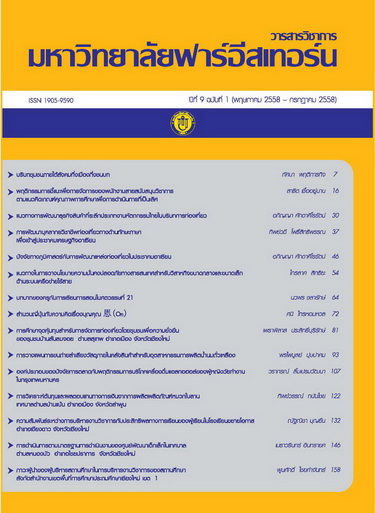สำนวนญี่ปุ่นกับความคิดเรื่องบุญคุณ 恩(On)
Main Article Content
Abstract
สำนวนเป็นสิ่งที่แสดงถึงระบบความคิดของคนในสังคม เป็นสิ่งที่สะท้อนให้เห็นสังคม และวัฒนธรรม
ในหลายๆ ด้าน เป็นสิ่งที่กล่าวถึงภูมิปัญญา ความคิดของมนุษย์ ที่เกิดขึ้นจากประสบการณ์ในการดำเนินชีวิตประจำวัน
ที่ถ่ายทอดมาจากบรรพบุรุษด้วยถ้อยคำสั้นๆ ซึ่งมีความหมายลึกซึ้งในแง่คำสอน สัจธรรม การวิจารณ์ตำหนิ
ข้อบกพร่องของบุคคลในสังคม เป็นต้น การศึกษาสำนวนญี่ปุ่นนอกจากจะช่วยให้ผู้เรียนภาษาญี่ปุ่นเข้าใจถึงระบบ
ภาษาญี่ปุน่ แลว้ ยังชว่ ยใหผู้เ้ รียนเขา้ ใจถึงวิธีคิด ทัศนคติ และความเชื่อของคนญี่ปุน่ อีกดว้ ย สำนวนญี่ปุน่ เปน็ สว่ นหนึ่ง
ที่สะท้อนให้เห็นว่า สังคมญี่ปุ่นเป็นสังคมที่ให้ความสำคัญในเรื่องความจงรักภักดี ความกตัญญูรู้คุณต่อเจ้านาย
ครูอาจารย์ บิดามารดา และผู้มีพระคุณ ซึ่งสอนว่าควรตอบแทนบุญคุณของเจ้านาย รวมทั้งผู้มีพระคุณคนอื่นๆ
การตอบแทนบุญคุณคน ถือเป็นคุณความดีที่ควรกระทำอย่างยิ่ง
Expressions can signify people’s thinking and reflect society and culture in various aspects.
They show human wisdom and perceptions generated from life experiences. The expressions are words
or phrases containing deep meanings of teachings, truths, criticisms of people’s weaknesses, and etc.
which transmitted from the ascendants. The study of Japanese expressions not only helps the learners
to understand Japanese language system, but also provides understanding of thinking, attitudes,
and beliefs of Japanese people. The Japanese expressions manifest that the Japanese society place
value on being loyal and grateful to masters, teachers, father and mother, as well as other benefactors.
The Japanese people have been taught that to reciprocate masters and all benefactors with loyalty is the
good deed they really should do.
Article Details
1. Any views and comments in the Journal of Social Innovation and Lifelong Learning are the authors’ views. The editorial staff have not to agree with those views and it is not considered as the editorial’s responsibility.
2. The responsibility of content and draft check of each article belongs to each author. In case, there is any lawsuit about copyright infringement. It is considered as the authors’ sole responsibility.
3. The article copyright belonging to the authors and The Far Eastern University are copyrighted legally. Republication must be received direct permission from the authors and The Far Eastern University in written form.

